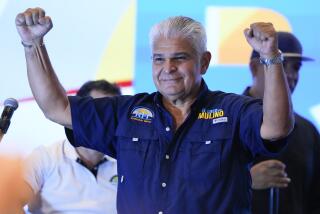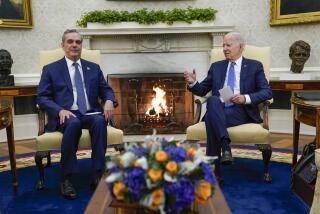Latin America’s tightrope-walking banker
- Share via
LAST WEEK’S ELECTION of Luis Alberto Moreno as president of the Inter-American Development Bank deserves more attention than it has received. The IDB is the biggest single source of development finance for its borrowers in Latin America and the Caribbean -- bigger than the World Bank and far bigger than the United States’ small foreign aid financing.
With a mandate to reduce poverty and increase social equity, the IDB lends about $6 billion annually to governments and private borrowers for education, infrastructure, judicial and regulatory reform, banking and tax administration, and environmental and other projects.
Yet Moreno’s election has received little notice in this country and not much more in Latin America. Currently the Colombian ambassador to the U.S., Moreno is a politically savvy diplomat and former minister of economic development. He was chosen from among five candidates nominated by their governments (from Brazil, Nicaragua, Peru and Venezuela as well as Colombia). In contrast to the World Bank, where the U.S. controls who becomes president and kept the recent selection of Paul Wolfowitz behind fully closed doors, voting rules at the IDB require candidates to put together a coalition in order to win. A successful candidate needs Washington’s assent because the U.S., the bank’s single-largest shareholder with 30% of the votes, can usually veto any candidate it dislikes. But he also needs the backing of a majority of the Latin American and Caribbean nations.
This double-majority voting arrangement (a majority of voting shares, a majority of the region’s countries) ensures more transparency and competition for the leadership position at the IDB than at the World Bank or the International Monetary Fund. It also puts responsibility for setting the agenda for Latin America where it belongs -- in the hands of Latin American governments and their Caribbean neighbors. And it ensures the U.S. can avoid a candidate whose politics it abhors -- in this round, for instance, Venezuelan President Hugo Chavez’s nominee. The election arrangement mirrors the larger setup at the bank: The Latin Americans set the positive agenda; the U.S. exercises a negative check against bad borrower behavior.
What results is an odd partnership -- one that Moreno will need to manage well in the face of at least two impending challenges.
First, Latin America is bound to face a financial crunch soon. The commodity boom that has generated its recent spurt of modest growth cannot go on forever. As interest rates rise in the U.S. (which they surely will), the flow of private capital that the region’s emerging markets need in order to sustain heavy debt loads -- given their limited domestic savings -- is bound to slow. Brazil, until recently the region’s best hope for combining fiscal responsibility with social gains and private-sector dynamism, seems especially vulnerable with its still-heavy debt load, high interest rates and a corruption scandal.
If Brazil does run into financial trouble, it will look to Moreno and the IDB for help. Moreno will need all his political smarts to persuade the U.S. Treasury to approve big, quick IDB lending and to bring in the IMF and the World Bank. The Washington institutions are still embarrassed and aggrieved over the chaos and loss of credibility that Argentina’s 2001-02 collapse brought, and the Bush administration has not given up its allegiance to a laissez-faire, do-nothing approach, except in a few exceptional cases.
The second challenge will play out less visibly over the next five years. The IDB cannot survive unless it stems the declining interest in borrowing (except when there is a crisis) among its large middle-income members: Brazil, Argentina, Colombia, Peru, Mexico and Venezuela. It is their borrowing that generates the net income that supports the staff and other administrative costs that make the bank a regional “brain trust.”
Borrowing is declining because the bank is a costly bureaucracy to deal with and because it has failed to diversify its products. It still relies almost entirely on the plain vanilla loan -- with little attention to the kinds of instruments that would catalyze private-sector flows, for example. If these countries were to gradually withdraw, the U.S. would lose too, because the bank is a more effective regional forum than the more overtly political Organization of American States.
It appears Moreno is politically astute -- and he’ll need to be to manage the odd and unusual partnership of the big borrowers and for the U.S. at the IDB.
More to Read
Sign up for Essential California
The most important California stories and recommendations in your inbox every morning.
You may occasionally receive promotional content from the Los Angeles Times.










